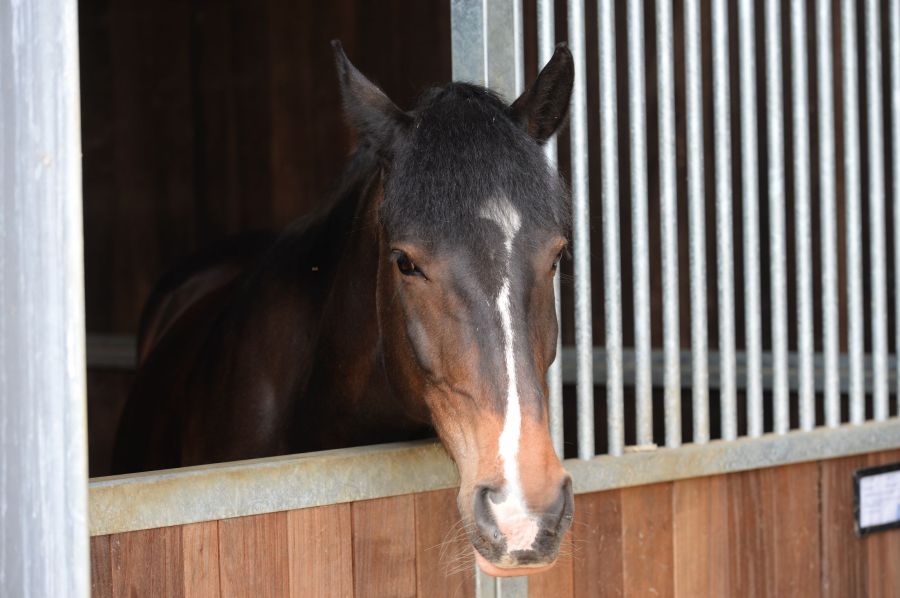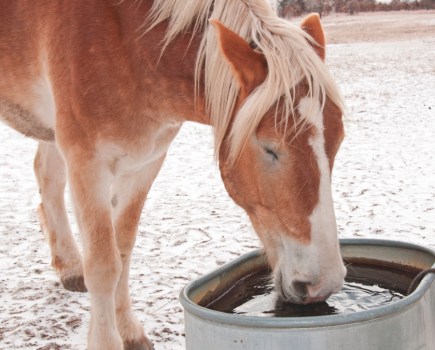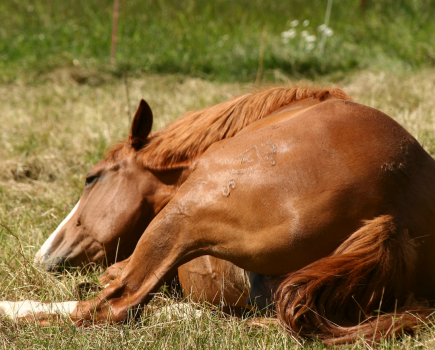A horse’s faeces becoming sloppy or watery is known as diarrhoea — and it can be a distressing health condition for both horse and owner.
It can be acute (lasting a couple of days) or chronic (lasting for more than a week) and there is usually an increase in the number of times the horse will go to the toilet.
Often an animal with diarrhoea can suffer from weight loss, or show signs of colic, and it is important to speak to your vet so that the problem can be diagnosed and treated as quickly as possible.
In November, owners were warned to be on their guard against colitis, for which diarrhoea is a symptom, after a spate of cases this winter following fluctuating temperatures and wet weather across the country
Two types of diarrhoea
Acute diarrhoea can be caused by a change in your horse’s routine – for example, if a new food is introduced, or a medication, such as an antibiotic or worming treatment, is given.
A sudden change in diet, or an oral medication, can change the gut microflora (friendly bacteria), leading to an overgrowth of unwanted bacteria in the intestine.
Some horses show signs of diarrhoea when they are travelling, which is usually the result of a stress response. More serious causes of acute diarrhoea include salmonella infection, eating toxic plants and peritonitis (inflammation of the membrane lining the abdominal cavity).
Chronic diarrhoea can follow on from acute diarrhoea, or may present as periods of normal faeces interspersed with episodes of diarrhoea. Causes of chronic diarrhoea include worms, bacterial infection, inflammatory bowel disease, ulceration and intestinal cancer.
Causes
In both acute and chronic diarrhoea, the initial cause results in damage to the intestinal wall, so the intestine can’t absorb water in the usual way.
Water remains inside the intestine, giving the faeces a watery consistency. Inflammation in the intestine can also cause an increase in the transit time — the time it takes for food to get from one end of the horse to the other.
When the intestinal wall becomes damaged, it cannot absorb the usual nutrients from food, so your horse may lose weight, especially if the diarrhoea persists for a longer period of time.
Diarrhoea in foals
A foal’s immune system is not as well developed as that of an adult horse, so foals can pick up infections more easily and become sicker more quickly.
At around seven days old, foal-heat diarrhoea can occur. This is usually nothing to worry about as the foal is usually bright, feeding well and not showing other signs of illness.
If a foal shows signs of systemic disease, such as a high temperature, reluctance to feed, or is looking quiet or depressed, then advice from a vet should be sought immediately to prevent deterioration.
Clinical signs
In cases of diarrhoea, the faeces can range from semi-solid to watery and there may be some urgency or straining to toilet. Often there will be faeces in the tail and down the legs, indicating that normal faecal balls are not being passed.
Some cases can be painful, resulting in the horse showing colic signs, such as pawing at the ground, lying down more than usual, rolling, kicking at the belly, looking at the flank, or not eating.
When the intestine is so damaged that it can’t absorb protein from the food, a condition called protein-losing enteropathy can develop. This is seen as a swelling underneath the belly, known as oedema.
Fresh blood can be seen in the faeces when there has been a large amount of damage to the intestinal wall or when the horse has been straining to pass faeces. The faeces often have a foul smell too.
Treatment
As diarrhoea often occurs as a result of a change in the diet, many horses recover very quickly without the need for treatment.
Horses suffering from more severe diarrhoea will need an assessment by a vet and may need to be hospitalised in order to reverse effects such as dehydration.
Initially, the main aims of treatment are to replace fluid that has been lost through the faeces and to try to make them more formed so they take longer to pass through the intestine.
Treatment generally includes fluid therapy (oral or intravenous, depending on the severity of dehydration), electrolytes, probiotics and pain relief. However, if the initial cause is still present, then it will be difficult to get the diarrhoea to stop.
Diagnosis
A panel of diagnostic tests should be carried out to identify the reason for the diarrhoea, including some or all of the following:
- Blood sample — to assess vital organs.
- Faecal sample — to look for parasites and bacteria.
- Ultrasound examination of the abdomen — to look for abnormalities in the gut and surrounding organs.
- Abdominal fluid sample — to look for bacterial infection, inflammatory cells and cancerous cells in the abdomen.
- Gastroscopy — to visualise the lining of the stomach wall.
- Intestinal biopsies — to make a further assessment of a piece of the intestinal wall.
Hopefully the results of these tests will identify the initial cause so that the most appropriate treatment or combination of treatments can be started.
Sometimes a diagnosis may not be found through testing and surgery may need to be performed to open up the abdomen and visualise all of the intestines, known as an exploratory laparotomy. Further samples can then be taken of parts of the intestine that were not able to be reached before.
Unfortunately, some causes of diarrhoea cannot be treated and euthanasia may be the only way to prevent further suffering.
Prevention tips
Some cases of diarrhoea can be prevented by following these tips:
- Ensure that your horse doesn’t have a heavy worm burden by carrying out worm egg counts every three months.
- When changing your horse’s diet, or switching to a new batch of hay, ensure that this is done gradually by mixing a small amount of the new feedstuff with the old so that the change is less sudden.
- Have your horse’s teeth checked every 6-12 months by your vet or equine dental technician to ensure that they are able to chew their food effectively.
- Regularly use a weightape and perform a body condition score on your horse so that you can tell if there has been any weight loss.
- A blood sample can be performed at the time of annual vaccination to check your horse’s vital organs. Any abnormalities can then be investigated before the signs of diarrhoea begin to show.
- If your horse needs to be on oral antibiotics for any reason, ensure that your vet knows about any previous reactions so that they can either use a different treatment or use gatro-protectants alongside the antibiotic medication.
Related content
- Peritonitis in horses, which can look a lot like colic, explained by a vet
- Impaction and gassy colic in horses explained by a vet
- Inside a horse’s digestive system and how to keep it healthy
- Gastric ulcers in horses: why the time of day you ride and feed is so important
- 10 golden rules of feeding for a happy and healthy horse








